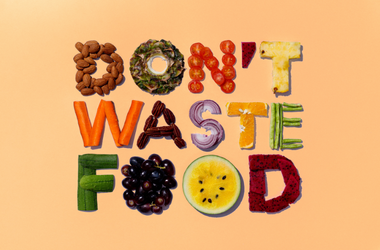Blog
Did you know that Americans throw away billions of pounds of food each year?
Such large amounts of waste have a significant impact on the environment, and part of this year's National Nutrition Month theme—fuel for the future—focuses on making healthier food choices with sustainability in mind. Even the smallest changes can make a huge difference.
 Shop in your pantry first.
Shop in your pantry first.
Before you start planning meals, take a look at whay you might have in your pantry, your refrigerator, and your freezer. You'd be surprised at the ingredients you already have on-hand. Plus, that means you'll be spending less at the grocery store and cutting down on waste before you've even left the house.
Buy smart.
Perishable foods need to be eaten or frozen within a few days of purchasing them—think fresh fruits and vegetables, dairy products, seafood, etc. Be realistic about how much you can eat in that time, and what kinds of things you'd like to freeze.
Have fun with your leftovers.
There are a lot of different ways to make the most out of those extra veggies. Add them to a salad or a bowl of pasta. Make a sandwich using your favorite bread. Combine them in a soup or stew, which you could freeze and eat again.
Understand the dates.
Most of the food you buy at a grocery store includes a date on it, which tells you when the item should be used or sold by.
You'll find "use by," "best by," or "best before" on things like salad dressing and other products that, for the most part, don't have to be refrigerated until after you open them. As long as they've been stored properly, you're probably safe to eat them beyond the date on the container.
The same goes for products with "sell by" dates. Perishable foods like meat and dairy products may be used a few days afer that date as long as they were stored at a safe temperature.
Work with a registered dietitian nutritionist.
A registered dietitian nutritionist (RDN) can help you learn more about nutrition and develop healthy eating habits, including things like portion control to stay within your daily calorie needs and reduce unnecessary waste. The RDNs at Saratoga Hospital have extensive training, and proven success in helping people make sustainable, positive changes.
If you're interested in working with our wonderful team of RDNs, please call 518-886-5121 to learn more. Physician referral is required.

